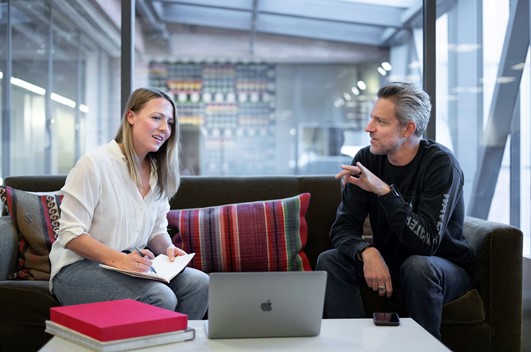Have you ever been stumped by an interview question?
At Transition Solutions, we have been helping companies and individuals with workforce changes for 30 years.
Successfully preparing for interviews will hopefully eliminate the often dreaded question that you have no good answer for. Interviewing can be stressful because the interviewee does not typically know the questions that will be asked ahead of time. We coach our clients to prepare and practice the best answers to common questions to hopefully ensure they can successfully answer even the toughest questions without pause.
We’ve shared some common tough interview questions below with feedback on how best to answer. You should think about each question and prepare the best answer based on your skills, experience and role you are interviewing for.
- Why did you leave your last job? Often the first question interviews start with that can set the tone for the interview. This can be a hard question to answer if you didn’t leave your last job by your own choice. Companies are adjusting the size of their workforce all the time, regardless of employee performance. This is important, as most interviewers are looking to ensure you were not let go due to performance issues. We coach our clients to keep their answer positive and brief. Don’t put down your current or previous employer and include where you are headed related to the job you are interviewing for.
- Tell me about yourself. Another question that often comes early in the interview process. The answer to this question is your 30 – 60 second professional infomercial. You should focus on your professional experience, education, greatest achievements, and where you are headed in your career. This could be a verbal version of the summary section on your resume. You should practice this answer to ensure you focus on the most important elements and confident delivery.
- What critical feedback have you received? This question is similar to “What are your greatest weaknesses?” Employers ask this question to see if you have a sense of self-awareness and that you’re actively working on self-improvement. To answer this question, think of a genuine piece of criticism you’ve been given, or a weakness you’re aware of that you have worked to overcome. Provide a brief explanation of the critique and how you’re working on improving it.
- Tell me about a time you overcame a difficult situation. Employers ask this question to understand how you deal with typical business challenges. We coach our clients to leverage “BAR” stories to share successes. The “B” stands for the business problem you were facing, “A” stands for the action you took to solve it and “R” represents the results. You want to focus on examples that produced positive results for the business based on your efforts.
- How do you handle stress? Stress is a component in many jobs, employers want to know you’ll handle it constructively with a good attitude to maintain good company culture. You can answer this question by explaining how you typically respond with an example to support it.
- What have been your most positive and negative management experiences? This question is typically to assess your fit with various management styles. To best answer this question, you should research the typical management style of the company you are interviewing for. Glassdoor often provides insights into management styles, as well as your network connections. A tactful answer can demonstrate leadership and flexibility when dealing with difficult experiences.
- Why do you want to work here? Employers often ask this question to make sure you’ve put thought and research into your decision to seek employment at their company. Think through this answer especially if you are changing industries, stepping down in terms of title or pay, or shifting roles. Companies want to hire people who really want to work for them in the role they are looking to fill. If the interviewer thinks you are over qualified or only going to take the job because you need it, you may not get an offer.
- Why should we hire you? You need to be the best candidate to get the offer. Therefore, you should explain how your experience, skills and attributes make you the best fit for the job. Make sure to carefully review the job description beforehand and leverage feedback you’ve received in the interview process to understand what qualities they’re looking for.
- What’s your greatest achievement? This is a wonderful opportunity to showcase your greatest accomplishments and differentiate yourself from other candidates. Select achievements that relate to the job you are interviewing for. We recommend leveraging our “BAR” stories approach outlined in number 4 above where you can discuss the business problem, action you took and the results. Quantitative results are the best to include. You can include qualitative results if needed.
- What are your salary requirements? You should come prepared to discuss your pay expectations. Today, the salary question can come up even at the first interview. If you’re unsure about what salary is appropriate to ask for the position you’re interviewing for, visit Glassdoor for typical salary estimates for the role and location you are interviewing for.
Your goal with each interview should be to move to the next phase of interviews or get the offer. The key to successful interviews is to prepare for common questions, especially those that could be more difficult to answer such as the examples above.
At Transition Solutions, we have been helping companies and individuals with workforce changes for thirty years. Our strong reputation for consistently delivering exceptional service at value sets us apart. If you would like more information on our services please check out our website at https://www.transitionsolutions.com/ or you can contact us directly at 888-424-0003 or email us at info@transitionsolutions.com.

